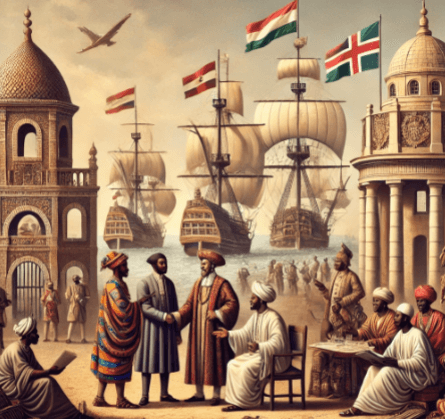Colonization and Politics in West Africa

West Africa has a long and complicated history. Colonization by European countries changed its politics forever. In the 19th century, European powers divided the land without caring about local cultures.
This caused conflicts that still affect West Africa today. From borders to governments, colonization’s impact is still clear. Even everyday things like betting reflect these struggles.
The Role of European Powers
Colonization brought European political systems to West Africa. Local rulers, who had governed for generations, were often replaced or sidelined. The French, British, and Portuguese created new borders, dividing ethnic groups and blending rival communities. These borders, drawn with little care for the people, still cause tension today.
For instance, ethnic groups like the Yoruba in Nigeria and Benin were split by borders that didn’t exist before. This led to conflicts as people tried to navigate the new realities. West African politics became a game played by European powers, with local rulers often finding themselves mere pawns.
Decolonization: Hope and Struggles
The mid-20th century brought independence to West African countries, but it wasn’t easy. Western-style governments were introduced, but these systems didn’t always fit. Traditional leaders struggled to adapt to new political frameworks. Imagine trying to build a house with a set of tools that doesn’t match the materials—frustrating and bound to fail.
In some countries, the transition to independence was chaotic. Civil wars broke out, governments fell, and military coups became common.
Modern Politics and the Influence of Colonization
Even today, colonization continues to shape politics in West Africa. Former colonial powers still influence these countries, often through international organizations. Many West African nations face problems like corruption and weak governments. These issues trace back to the colonial era, when political systems were designed to benefit Europeans, not locals. The consequences are long-lasting and hard to overcome.
Still, there are signs of progress. Some countries, such as Ghana, are building democratic systems based on their own traditions. The challenge is finding a balance between modern politics and ancient customs. It’s like walking a narrow bridge—slow and steady steps can lead to success, but any mistake could cause instability.
How Colonial Borders Caused Problems
When European countries split up West Africa, they ignored local communities. They created new borders without thinking. These borders forced rival groups to live together.
This caused fights and disagreements. Many of these problems still exist today. The political issues in West Africa often come from these colonial borders.
The Struggle for Control
Traditional leaders, who had governed their regions for generations, were often pushed aside by colonizers. European rulers imposed their systems, placing officials from their own countries in charge. These changes weakened local leadership and disrupted political systems. In some places, traditional rulers were allowed to stay, but only if they followed European orders. This reduced their power and left them as figureheads in their own land.
When West African countries became independent in the mid-1900s, there was hope for a bright future. But the new governments were built on weak foundations. They had to use political systems that didn’t fit their local cultures or needs.
This caused confusion. Leaders struggled to balance their old traditions with new ways of governing. Many countries faced political problems as they tried to figure out how to move forward. It was a difficult time, with many challenges along the way.
Modern-Day Challenges
Today, many West African nations are still struggling with the political legacy of colonization. Corruption, weak governments, and authoritarian regimes are common. Some leaders use the same tactics as their colonial predecessors, consolidating power and silencing opposition. Others are genuinely trying to build democratic institutions, but the road is difficult. The remnants of colonization make it hard for these nations to break free from the past and move forward.
Foreign Powers Still Have Influence
Even though colonization ended, former colonial powers still have a lot of influence in West Africa. They often do this through international organizations, which shape the region’s politics. Some countries rely on help and advice from these powers.
This makes it hard for them to create fully independent political systems. It’s like trying to steer a ship when someone else is holding the wheel—progress is slow and hard to control.
A Simple Path to the Future
Even with many problems, there is hope for West Africa. Countries are trying to improve their political systems and create stable governments. Leaders are finding ways to mix their old traditions with new political ideas. This helps them build solutions that fit their unique cultures.
Conclusion
West Africa’s political landscape is a mix of colonial legacy and local traditions. The region continues to feel the effects of colonization in its borders, governments, and conflicts. However, the resilience of its people shows that change is possible. Like betting, political decisions in West Africa are a gamble—uncertain, but full of possibilities.


